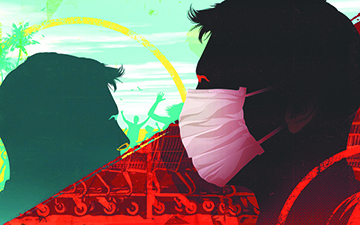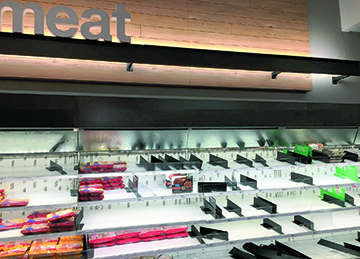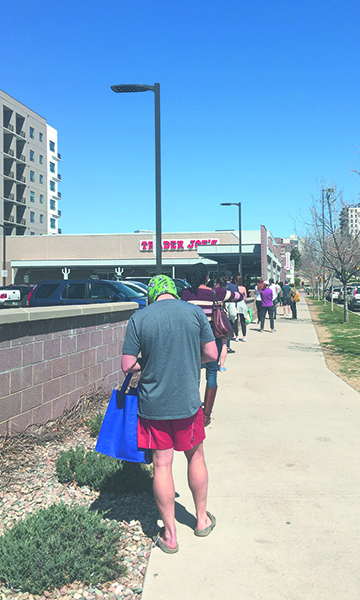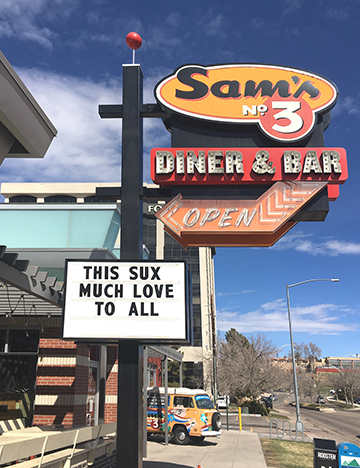Hoping For ‘May Day’ Virus Shift Despite Being Nation’s Ninth Most Aggressive Against Bug, The City-State’s Workforce Is Among Most Hurt By COVID-19
by Glen Richardson
After being hunkered down at home from late March through April due to the coronavirus, this is the month seedlings seek the sun, and birds call for mates. This month we humans may or may not be able to enjoy “May Day” celebrations. Instead, the French “Mayday” signal that we are in a life-threatening situation may remain in effect.

March 23, the day Denver Mayor Michael Hancock implemented a stay-at-home order, its impacts — and that of weeks of social distancing — are continuing to cut unevenly among residents and businesses. Many hunkered down and begin working from home. For others, it was when they lost their livelihoods or saw their businesses shuttered. At the halfway point between the spring equinox and summer solstice, it remains uncertain when or whether we will be able to enjoy nature’s exuberance.
With concerts and sports event-seasons canceled, restaurants and shops shuttered, the coronavirus pandemic has pushed the tone of social media and news channel reports to a fever pitch. Valley residents have reacted to the bombardment of COVID-19 news with fearful anticipation, leading to panic buying and empty grocery store shelves.
Panic Purchasing
The “stay at home” order will run until at least May 10. Mandating the closure of all businesses in the city not deemed “essential,” the order sparked renewed lengthy grocery-liquor store lines. Within three hours the resulting panic purchasing caused the Mayor to update the order allowing liquor stores and recreational dispensaries to remain open with social distancing.

The Mayor, however, deems construction projects in the city as “essential.” Businesses that don’t comply are subject to a $999 fine per violation. Governor Jared Polis — who had resisted making the move — ordered a statewide stay-at-home-order effective March 26 through April 26.
With Denver the financial hub of Colorado, new data reveals the state’s workforce has been one of the most hurt by COVID-19. The state has seen a 4,222% increase in the number of unemployment claims (April 2020 vs. January 2020). There were 105,073 claims filed for the week of April 6, 2020, vs. just 2,431 the week of January 1, 2020, the second highest increase in the U.S. Data is according to a comparison made by financial website WalletHub based on increased unemployment claims in the 50 states and the District of Columbia, Furthermore, for the month of April 2020 vs. April 2019, Colorado had the nation’s fourth highest increase, 105,073 for the week of April 6, 2020 vs. 2,037 the week of April 8, 2019. The state paid $92 million in unemployment benefits during the two week period ending April 14.
Business Borrowing
The Colorado Department of Labor & Employment is calling the surge of unemployment claims “unprecedented,” and worse than the Great Recession. Small businesses in the

state have received 28,469 loans totaling nearly $6 billion to keep their companies afloat during the pandemic.
Forecasters now project Colorado’s state revenues for the next fiscal year beginning July 1 will drop about $750 million
The state’s predicament is despite the fact Colorado has been the ninth most aggressive state versus the coronavirus, again according to WalletHub. The state ranked 17th nationally in tested cases of COVID-19 per capita. Colorado ranked even better, 12th for share of workers with access to paid sick leave and 15th for public hospital system quality. The state ranked 20th in public healthcare spending per capita and 23rd in state and local public health laboratories per capita. Only 62.1% of Colorado residents received a checkup in the past year, fifth-lowest in the U.S. Yet, Colorado has the second lowest percentage of residents reporting poor health in the U.S. (3.5%).
Restaurant Uncertainty
A survey by the Denver-based Colorado Restaurant Assn. shows that between March 1 and March 22, 2% of the state’s restaurants had permanently closed. However, those businesses said that over the next 30 days, another 14% anticipated doing the same. The association also estimates restaurants lost $465 million in sales during the first 22 days of March.

Deli-bistro The Market on Larimer Street is among the first to announce it is shutting down permanently, in part due to the COVID-19 outbreak. The Larimer Square icon has been in business for 37 years. It closed its doors at the end of March and will move out of the space once Denver’s stay-at-home order is lifted.
Yet another Larimer Square eatery, Euclid Hall Kitchen & Bar — in business for 10 years — also closed its doors in March. Chef-owner Jennifer Jasinski who also owns four other Denver restaurants is worried about talk that restaurants will only be allowed to reopen gradually. “Are we going to have to seat every other table? There are so many questions up in the air, and we want to bring our staff back on,” she told Mile High home page BusinessDen.
Hints Of Hope
For those who are infected as well as those trying to avoid infection, these are trying times. But amid all the doom and gloom, there are some positive stories, messages and reasons to remain hopeful.
Observing the changing city skyline during the outbreak, one local resident responded on neighborhood hub Nextdoor, “Denver is now like it was almost 40 years ago: no traffic, no pollution, hardly any noise.”
A local violinist-vocalist who teaches at Denver-based music school Primavera Place, told online network Alignable, “I gathered a couple of my neighbors who are also musicians, and we put on a concert in the cul-de-sac for the neighborhood, with lawn chairs arranged six-ft. apart.” The school gives lessons online to 60 plus students and is planning a virtual concert sometime in May.
Hilarity Helps
There’s also been an outpouring of gags, memes, funny videos, and general silliness. We might be scared, but we seem determined to carry on laughing.
Families and their dogs have been among the most visible walking Valley streets on sunny days during the shutdown. One told us, “Dogs created the corona virus so that we have to stay home and can only interact with them.”
The requirement to stay at home and avoid in-person contact with others does seem wearing and irksome. That Cherry Creek Valley families and businesses flourish on community and doing things together makes it doubly difficult. To keep us centered, several social outlets sent this aide-mémoire: “Your grandparents were called to war. All you are asked to do is sit on the couch. You can do this!”
Where’s The Meat: Virus scare that initially emptied the paper aisle in grocery stores, soon also exhausted supplies in the meat section at many stores.
Humor Helps: Valley families are staying sane by laughing during the stay at home order. There has been a deluge of videos, internet memes and silliness to keep us giggling and amused.
